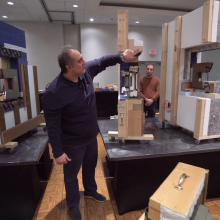2026 What’s Changing for Builders: Codes, Incentives, and What to Know
Course overview:
This in-person session kicks off the 2026 Building Better Series and is built for builders who want a clear, practical outlook on what is changing this year. It focuses on the code updates, policy shifts, and technical requirements that will shape residential construction in 2026.
We will cover changes to Energy and Zero Carbon requirements, updates to the 19% incentive in the City of Vancouver, and system-level updates such as electrical servicing for multiplex projects and seismic requirements.









